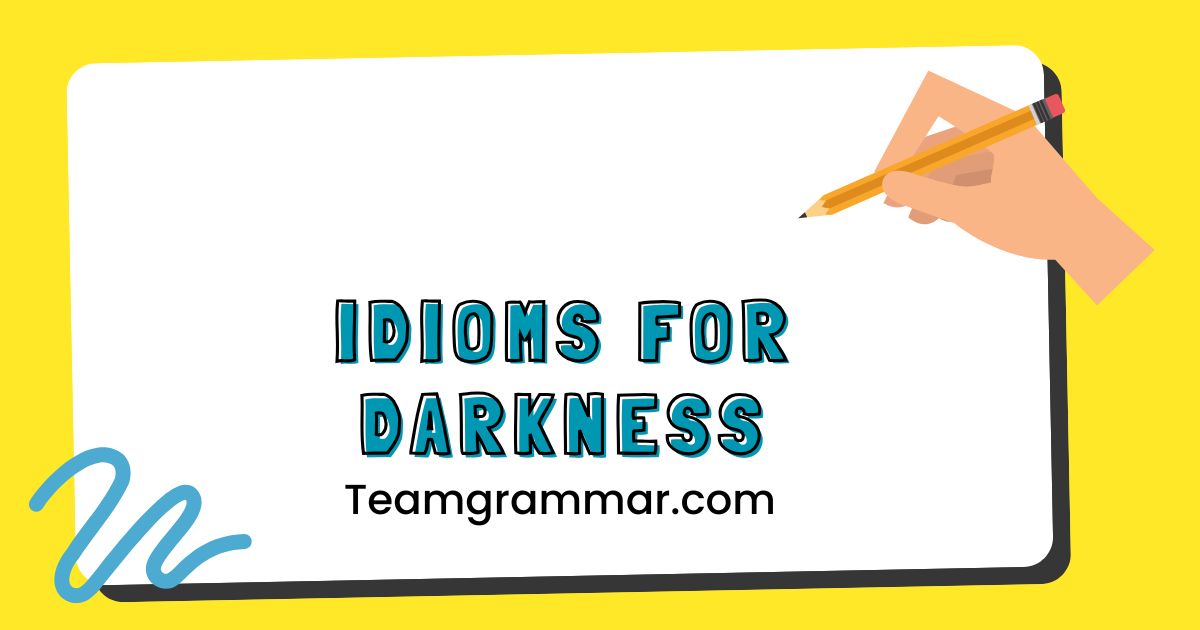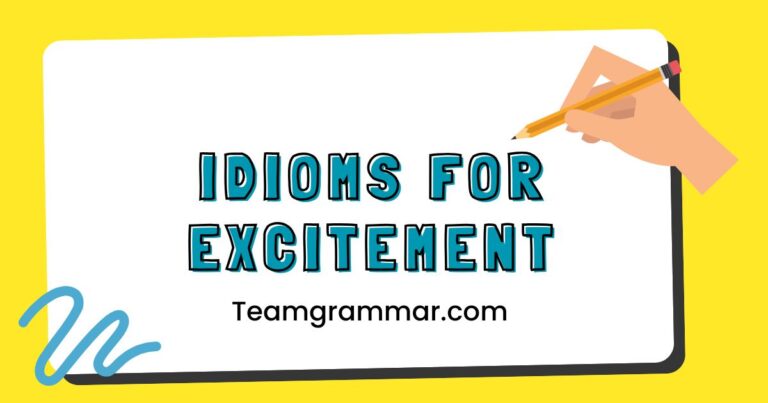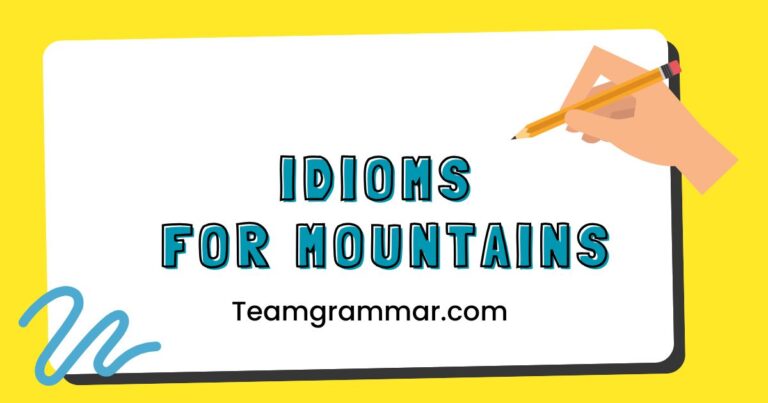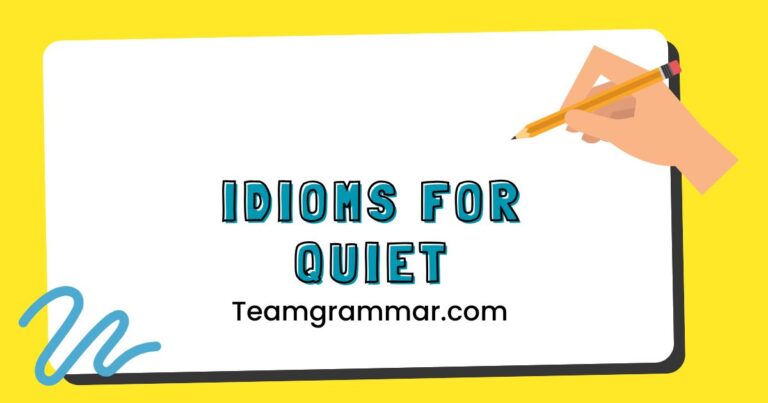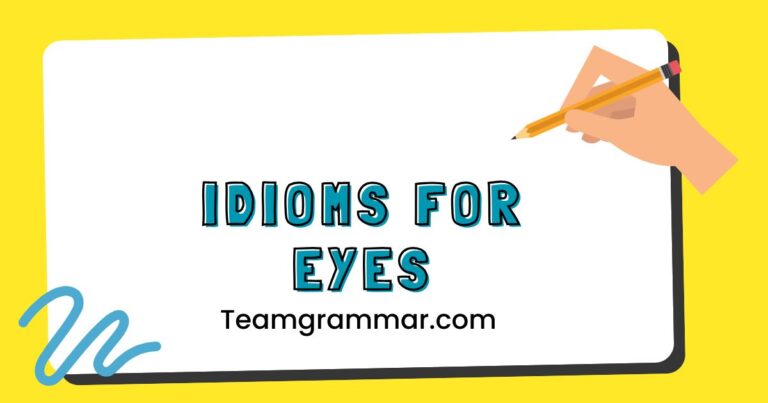43 Idioms for Darkness: Mastering Figurative Language
Understanding idioms is crucial for mastering English, as they add color and depth to communication. Idioms related to darkness are particularly evocative, painting vivid pictures and conveying nuanced meanings beyond their literal interpretations.
This article explores common idioms that use “darkness” figuratively, enhancing your comprehension and expression. From beginners to advanced learners, this guide provides definitions, examples, and practical exercises to illuminate your path to fluency.
Table of Contents
- Introduction
- Definition of Idioms for Darkness
- Structural Breakdown
- Types and Categories
- Examples of Idioms for Darkness
- Usage Rules
- Common Mistakes
- Practice Exercises
- Advanced Topics
- FAQ
- Conclusion
Definition of Idioms for Darkness
Idioms are expressions where the overall meaning differs from the literal meanings of the individual words. When related to “darkness,” these idioms typically use the absence of light as a metaphor for ignorance, secrecy, despair, or evil.
Understanding these idioms requires recognizing the figurative connection between the literal darkness and the abstract concept it represents.
Classification: Idioms can be classified based on their grammatical structure (e.g., phrasal verbs, prepositional phrases) or their conceptual domain (e.g., idioms of time, idioms of emotion). Idioms of darkness belong to the conceptual domain category, specifically focusing on metaphors related to the absence of light.
Function:Idioms serve several functions in language. They add color and expressiveness, convey complex ideas concisely, and establish common ground between speakers.
Idioms of darkness, in particular, evoke strong emotional and visual imagery, making communication more impactful.
Contexts:These idioms are commonly found in literature, everyday conversation, and formal writing. Their usage depends on the intended audience and the overall tone of the communication.
For example, “a dark secret” might appear in a novel or a news report, while “in the dark” is common in everyday conversations.
Structural Breakdown
The structure of idioms involving darkness often includes keywords like “dark,” “night,” “shadow,” and “black.” These words act as metaphorical anchors, linking the literal concept of darkness to the figurative meaning. The structural patterns can vary, including:
- Noun Phrases: e.g., “a dark horse,” “the dark ages.” These phrases use “dark” to modify a noun, creating a figurative meaning.
- Prepositional Phrases: e.g., “in the dark,” “out of the shadows.” Here, “dark” or “shadows” is part of a prepositional phrase, indicating a state or condition.
- Verb Phrases: e.g., “cast a shadow,” “darken the mood.” These phrases use verbs to describe actions that relate to darkness, metaphorically affecting a situation or feeling.
- Adjectival Phrases: e.g., “dark and stormy,” “black as night.” These phrases use adjectives to describe the intensity or quality of darkness, often used to intensify the meaning.
Understanding these patterns helps in recognizing and interpreting idioms of darkness. Recognizing the structural components allows you to grasp the underlying meaning even if you haven’t encountered the specific idiom before.
Types and Categories
Idioms for darkness can be categorized based on the specific figurative meanings they convey. Here are some key categories:
Ignorance & Lack of Knowledge
These idioms use darkness to represent a lack of awareness or understanding. They suggest being uninformed or unaware of crucial information.
Mystery & Secrecy
Darkness is often associated with hidden things, secrets, and mysteries. These idioms relate to situations where information is concealed or unclear.
Gloom & Despair
Darkness can symbolize negative emotions such as sadness, depression, and hopelessness. These idioms describe states of emotional distress or negativity.
Evil & Immorality
In many cultures, darkness is linked to evil, wickedness, and immoral behavior. These idioms describe actions or intentions that are malevolent or corrupt.
Examples of Idioms for Darkness
Here are some detailed examples of idioms for darkness, organized by category, to help you understand their meanings and usage.
Idioms of Ignorance
These idioms describe situations where someone is unaware or uninformed about something. These phrases are commonly used in everyday conversations and writings to express a lack of knowledge.
| Idiom | Meaning | Example Sentence |
|---|---|---|
| In the dark | Unaware or uninformed about something. | I was completely in the dark about the surprise party. |
| Keep someone in the dark | To not tell someone about something. | They decided to keep me in the dark about the company’s financial problems. |
| A shot in the dark | A guess or attempt that has little chance of success. | Applying for that job was a shot in the dark, but I had nothing to lose. |
| Dark horse | A candidate or competitor who is unexpectedly successful. | He started as a dark horse in the election, but quickly gained popularity. |
| As black as pitch | Extremely dark. | The night was as black as pitch, making it hard to see anything. |
| Black box | A system where the inputs and outputs are known, but the internal workings are not. | The algorithm is like a black box; we know what it does, but not how. |
| Blackout | A temporary loss of consciousness or memory; also, a failure of electrical power. | She had a blackout after the accident and couldn’t remember what happened. |
| Dark continent | A term formerly used to describe Africa, reflecting European ignorance of the continent. | Historically, Africa was referred to as the ‘dark continent‘ due to lack of exploration by Europeans. |
| Dark ages | A period of cultural and economic decline in Europe following the fall of the Roman Empire. | Some historians refer to the early Middle Ages as the Dark Ages. |
| A leap in the dark | Taking a risk without knowing the consequences. | Starting a new business without any experience is like taking a leap in the dark. |
| Whistling in the dark | Trying to stay cheerful in a frightening situation. | Despite the looming deadline, he was just whistling in the dark, knowing he wouldn’t finish on time. |
| Blind spot | An area where one cannot see, either literally or figuratively, referring to a lack of awareness. | Her blind spot in the negotiation was her lack of understanding of their financial situation. |
| Clouded judgment | Impaired or unclear thinking due to emotions or other factors. | His clouded judgment led him to make a series of poor decisions. |
| Fog of war | The uncertainty in situational awareness experienced by participants in military operations. | In the fog of war, it’s often difficult to distinguish friend from foe. |
| Mired in ignorance | Stuck or trapped in a state of not knowing or understanding. | The public was mired in ignorance about the effects of the new policy. |
| Shrouded in mystery | Covered or concealed by something that is difficult to explain or understand. | The origins of the artifact remain shrouded in mystery. |
| Lost in the woods | Confused or disoriented, unable to find one’s way. | Without a map, they quickly became lost in the woods. |
| Blank slate | A mind not yet affected by experiences, impressions, etc. | The new intern came in as a blank slate, ready to learn everything. |
| Obscured by shadows | Hidden or unclear due to surrounding darkness. | The truth was obscured by shadows and half-truths. |
| Veiled in secrecy | Covered or concealed in a secretive manner. | The project was veiled in secrecy to prevent competitors from finding out. |
| Groping in the dark | Searching uncertainly or blindly. | Without any clues, the detectives were groping in the dark. |
| Navigating uncharted waters | Dealing with a situation that is unfamiliar and potentially dangerous. | Starting a business in a new market is like navigating uncharted waters. |
| Walking a tightrope | Being in a precarious or risky situation. | Balancing work and family life can feel like walking a tightrope. |
Idioms of Mystery
These idioms use darkness to represent secrecy, hidden information, or unexplained events. These expressions are often used in literature and storytelling to create suspense and intrigue.
| Idiom | Meaning | Example Sentence |
|---|---|---|
| Dark secret | A secret that is unpleasant or shameful. | The family had a dark secret that they had been hiding for years. |
| Shadowy figure | A person who is mysterious or suspicious. | A shadowy figure was seen lurking near the building. |
| Black market | An illegal market where goods or services are traded. | They were selling stolen goods on the black market. |
| Under the table | Done secretly or illegally. | The payment was made under the table to avoid taxes. |
| Hidden agenda | A secret plan or motive. | I suspect he has a hidden agenda behind his friendly facade. |
| Swept under the rug | To hide or ignore a problem or mistake. | The scandal was quickly swept under the rug to protect the company’s reputation. |
| Behind closed doors | In private or secret. | The decision was made behind closed doors without consulting the public. |
| A closed book | Something that is difficult to understand or know about. | Quantum physics is still a closed book to many scientists. |
| Cloak and dagger | Involving espionage, intrigue, and secrecy. | The movie was full of cloak and dagger activities. |
| Pull strings | To use one’s influence to get something done, often secretly. | He had to pull strings to get his son into the prestigious school. |
| Keep under wraps | To keep something secret until a later time. | The details of the project were kept under wraps until the official announcement. |
| Smoke and mirrors | Deception or trickery used to obscure the truth. | The politician used smoke and mirrors to distract voters from the real issues. |
| Unearth the truth | To discover or reveal something that was previously hidden. | The journalist worked tirelessly to unearth the truth about the corruption scandal. |
| In camera | In private, especially in a judge’s chambers. | The judge decided to hear the testimony in camera. |
| Sub rosa | Secretly or confidentially. | The agreement was made sub rosa between the two parties. |
| Veiled threat | An indirect or subtle threat. | His comment was a veiled threat, hinting at possible consequences. |
| Ambiguous | Open to more than one interpretation; not having one obvious meaning. | The politician’s statement was intentionally ambiguous to avoid committing to a specific position. |
| Cryptic | Mysterious or obscure in meaning. | The message was so cryptic that no one could understand it. |
| Enigmatic | Difficult to interpret or understand; mysterious. | The Mona Lisa’s smile is one of the most enigmatic images in art. |
| Undercover | Working secretly to obtain information. | The detective was working undercover to catch the criminals. |
| Murky waters | A situation that is confusing or difficult to understand. | The investigation led them into murky waters of political intrigue. |
| Out of the shadows | To come out of obscurity or secrecy. | The artist finally stepped out of the shadows and revealed his identity. |
| Behind the curtain | In a position of power or control, often secretly. | He was the one behind the curtain, making all the important decisions. |
Idioms of Gloom
These idioms use darkness to represent sadness, depression, or hopelessness. They vividly portray negative emotional states and are often used in literature and personal narratives.
| Idiom | Meaning | Example Sentence |
|---|---|---|
| Dark days | A period of unhappiness or difficulty. | The country went through dark days during the economic recession. |
| Black mood | A feeling of anger, sadness, or depression. | He’s been in a black mood ever since he lost his job. |
| Cast a shadow | To spoil or ruin something. | The scandal cast a shadow over his entire career. |
| Darken the door | To visit someone’s house, usually unwelcome. | Don’t you ever darken my door again! |
| Black dog | A term for depression or a bad mood. | He’s been battling the black dog for years. |
| Cloud over | To become gloomy or sad. | Her face clouded over when she heard the bad news. |
| Bleak outlook | A pessimistic or unfavorable view of the future. | The company’s financial situation suggests a bleak outlook. |
| Down in the dumps | Feeling sad or depressed. | She’s been down in the dumps since her cat died. |
| Heavy heart | Feeling sad or burdened by grief. | He left the funeral with a heavy heart. |
| Long face | An expression of sadness or disappointment. | Why the long face? What happened? |
| Rainy day | A difficult time in the future. | It’s good to save money for a rainy day. |
| Shed light on | To clarify or explain something. | The investigation helped to shed light on the cause of the accident. |
| Touch and go | Uncertain or precarious. | His condition was touch and go after the surgery. |
| Under a cloud | Under suspicion or disgrace. | He’s been under a cloud since the allegations came out. |
| Woe is me | An expression of great sorrow or distress. | “Woe is me!” she cried, after failing the exam. |
| Gloom and doom | Pessimism and a feeling that things will go badly. | The news report was full of gloom and doom about the economy. |
| Shadow of doubt | A feeling of uncertainty or suspicion. | There’s a shadow of doubt hanging over the project. |
| Darkest hour | The most difficult or dangerous time. | During the war, the country faced its darkest hour. |
| At the end of one’s rope | Having no more patience or energy. | After weeks of sleepless nights, she was at the end of her rope. |
| In the doldrums | In a state of inactivity or stagnation. | The company has been in the doldrums for the past few months. |
| On the rocks | Likely to fail or end. | Their marriage is on the rocks after the affair. |
| Sing the blues | To feel sad or depressed. | He’s been singing the blues ever since he lost his job. |
| Storm clouds gathering | Trouble is brewing or approaching. | With the rise in tensions, storm clouds are gathering over the region. |
Idioms of Evil
These idioms use darkness to represent evil, immorality, or malicious intent. They are often used in narratives to depict villains and negative actions.
The expressions create a sense of foreboding and moral corruption.
| Idiom | Meaning | Example Sentence |
|---|---|---|
| Black sheep | A person who is considered a disgrace or outcast in a family or group. | He was the black sheep of the family, always getting into trouble. |
| Black-hearted | Evil or cruel. | The villain was a black-hearted man who cared for no one. |
| Dark deed | An evil or wicked act. | He committed a dark deed that he would regret for the rest of his life. |
| Shadowy dealings | Secret or dishonest activities. | The company was involved in shadowy dealings with corrupt officials. |
| Blackmail | To extort money or favors by threatening to reveal damaging information. | He tried to blackmail her by threatening to expose her past. |
| Dark side | The evil or negative aspect of something. | Every person has a dark side that they try to keep hidden. |
| Sinister | Giving the impression that something harmful or evil is happening or will happen. | There was something sinister about the way he smiled. |
| Underhanded | Acting or done in a secret or dishonest way. | He used underhanded tactics to win the election. |
| Wicked | Evil or morally wrong. | The wicked witch cast a spell on the princess. |
| Serpent in the grass | A hidden danger or enemy. | He pretended to be a friend, but he was a serpent in the grass. |
| Rotten to the core | Completely corrupt or evil. | The entire organization was rotten to the core. |
| Turn a blind eye | To ignore something that one knows is wrong. | The police turned a blind eye to the illegal activities. |
| Bad blood | Feelings of animosity or hatred. | There’s a lot of bad blood between the two families. |
| Devil’s advocate | Someone who argues against a proposal to test its validity. | I’m just playing devil’s advocate to see if your plan holds up. |
| Machiavellian | Cunning, scheming, and unscrupulous, especially in politics. | His Machiavellian tactics helped him rise to power. |
| Shadow government | A secret or unofficial government that exerts influence behind the scenes. | Some believe that a shadow government controls the country’s policies. |
| Wolf in sheep’s clothing | A person who appears friendly but is actually dangerous. | He seemed nice at first, but he turned out to be a wolf in sheep’s clothing. |
| Dark arts | Evil or magical practices. | The wizard practiced the dark arts to gain power. |
| Unholy alliance | A partnership between groups or individuals with conflicting interests. | An unholy alliance was formed to overthrow the government. |
| Dance with the devil | To engage in risky or immoral behavior. | He knew he was dancing with the devil when he accepted the bribe. |
| Pandora’s box | A source of great and unexpected troubles. | Opening the investigation was like opening Pandora’s box, unleashing a series of problems. |
| Skeletons in the closet | Embarrassing or damaging secrets from the past. | Every family has skeletons in the closet. |
Usage Rules
Using idioms correctly involves understanding their context and intended meaning. Here are some guidelines:
- Consider the Audience: Avoid using idioms if you are speaking to someone who may not be familiar with English or with the specific cultural context.
- Match the Tone: Use idioms that fit the tone of your communication. Some idioms are informal, while others are more appropriate for formal settings.
- Avoid Overuse: Using too many idioms can make your speech sound unnatural or forced. Use them sparingly to add color and emphasis.
- Understand the Nuances: Be aware of the subtle differences in meaning between similar idioms. Choose the one that best conveys your intended message.
- Context is Key: The meaning of an idiom can change depending on the context. Always consider the surrounding words and phrases to ensure you are using the idiom correctly.
For example, “in the dark” can mean simply “uninformed,” but it can also imply a deliberate attempt to keep someone ignorant. Pay attention to the context to determine the precise meaning.
Common Mistakes
Here are some common mistakes to avoid when using idioms related to darkness:
| Incorrect | Correct | Explanation |
|---|---|---|
| I am in the black. | I am in the dark. | “In the black” refers to financial profit, not ignorance. |
| He kept me on the dark. | He kept me in the dark. | The correct preposition is “in.” |
| It was a shot in the night. | It was a shot in the dark. | The idiom uses “dark,” not “night.” |
| She has a dark heart. | She is black-hearted. | “Black-hearted” is the correct idiom to describe someone evil. |
| Don’t shadow my door again. | Don’t darken my door again. | The correct verb is “darken,” not “shadow.” |
These are just a few examples. Pay close attention to the specific words and prepositions used in each idiom to avoid making these common mistakes.
Practice Exercises
Test your understanding of idioms for darkness with these exercises.
Exercise 1: Fill in the Blanks
Complete the sentences with the correct idiom from the list below.
Idiom List: in the dark, dark horse, black sheep, cast a shadow, swept under the rug
| Question | Answer |
|---|---|
| 1. The scandal threatened to ________ over the company’s reputation. | cast a shadow |
| 2. He was always considered the ________ of the family because he never followed the rules. | black sheep |
| 3. I was completely ________ about their plans for the weekend. | in the dark |
| 4. The company tried to have the accounting error ________. | swept under the rug |
| 5. No one expected him to win, but he emerged as a ________ in the election. | dark horse |
Exercise 2: Matching
Match the idiom with its correct meaning.
| Idiom | Meaning |
|---|---|
| 1. Black market | A. A secret plan or motive |
| 2. Hidden agenda | B. Feeling sad or depressed |
| 3. Down in the dumps | C. An illegal market |
| 4. Turn a blind eye | D. To ignore something wrong |
| 5. Shadowy figure | E. A mysterious person |
Answers:
| Question | Answer |
|---|---|
| 1. Black market | C. An illegal market |
| 2. Hidden agenda | A. A secret plan or motive |
| 3. Down in the dumps | B. Feeling sad or depressed |
| 4. Turn a blind eye | D. To ignore something wrong |
| 5. Shadowy figure | E. A mysterious person |
Exercise 3: Sentence Completion
Complete the following sentences using an appropriate idiom related to darkness.
| Question | Answer |
|---|---|
| 1. After losing the game, he was ________. | singing the blues |
| 2. The company’s future is ________ after the scandal. | on the rocks |
| 3. The project was ________ to prevent leaks. | kept under wraps |
| 4. He always uses ________ to get what he wants. | underhanded tactics |
| 5. Saving money is important for a ________. | rainy day |
Advanced Topics
For advanced learners, consider exploring the cultural and historical contexts of these idioms. Many idioms have roots in specific historical events or cultural traditions.
Understanding these origins can provide a deeper appreciation for the nuances of the language. For instance, the term “dark ages” has specific historical connotations related to European history, while other idioms may have literary or mythological origins.
Additionally, explore how idioms related to darkness are used in different genres of literature and media. Notice how authors and filmmakers use these idioms to create atmosphere, develop characters, and convey themes.
Analyzing the use of idioms in context can further refine your understanding and usage.
FAQ
- What is an idiom?
An idiom is a phrase or expression whose meaning cannot be understood from the literal meanings of its individual words. It’s a figure of speech that has a culturally understood meaning.
- Why are idioms important to learn?
Idioms are important because they are commonly used in everyday conversation and literature. Understanding idioms helps you comprehend the nuances of the English language and communicate more effectively.
- How can I learn new idioms?
You can learn new idioms by reading books, watching movies, listening to podcasts, and paying attention to how native speakers use language. Keep a notebook to record new idioms and their meanings.
- Are idioms the same in all English-speaking countries?
No, idioms can vary between different English-speaking countries and regions. Some idioms are specific to certain cultures or dialects.
- Can I use idioms in formal writing?
It depends on the idiom and the context. Some idioms are appropriate for formal writing, while others are more informal. Consider your audience and the tone of your writing.
- What is the difference between an idiom and a metaphor?
A metaphor is a figure of speech that directly compares two unrelated things, while an idiom is a fixed expression with a non-literal meaning. Idioms often contain metaphors, but not all metaphors are idioms.
- How do I know when to use an idiom?
Use idioms when they fit the context of your communication and when you are confident that your audience will understand them. Avoid using idioms if you are unsure of their meaning or if they might be confusing.
- What should I do if I don’t understand an idiom?
Ask for clarification! Don’t be afraid to ask someone to explain the meaning of an idiom if you don’t understand it. You can also look it up in a dictionary or online resource.
- Are there resources to help me learn idioms?
Yes, there are many resources available, including dictionaries of idioms, websites, and language learning apps. Look for resources that provide definitions, examples, and practice exercises.
- How can I practice using idioms?
Practice using idioms in your writing and speaking. Try to incorporate a few new idioms into your everyday conversations. You can also create flashcards or use online quizzes to test your knowledge.
Conclusion
Mastering idioms related to darkness can significantly enhance your understanding and usage of the English language. These idioms add
color to your speech, making it more expressive and nuanced.
By understanding the definitions, structural breakdowns, and usage rules of these idioms, you can effectively communicate complex ideas and emotions. Remember to practice regularly and be mindful of the context in which you use them.
With dedication and practice, you’ll be able to navigate the subtle shades of meaning and use idioms of darkness with confidence.

